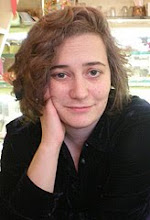The Architecture Foundation launched the European Prize for Public Space this week, won this year by Barking Town Square, which is, I’m told, a rare of example of new genuinely public space. I haven’t yet been there so I can’t comment on what it’s like but it was good to hear Sarah Gaventa, director of CABE Space, talking of the importance of keeping streets and public places truly public. Mark Brearley, who as head of Design for London is arguably London's most influential designer, unfortunately didn’t agree. He claimed Sarah’s take – which referred to the arguments in ‘Ground Control’ - was ‘alarmist’. That's the point: it is alarming.
Alarm and fear were very much the order of the day, at ‘Maximum and Minimum’, a conference organised by Cambridge University’s architecture department yesterday. I was speaking in a session on ‘The anxious city’, with interesting contributions from architecture critic Penny Lewis, planning academic Jon Coaffee and Richard Williams author of ‘The anxious city’, from which our session took its name. Coaffee talked about that latest buzzword, ‘Resilience’ and how the idea of creating ‘Resilience’ in places – buildings, public places, communities – is becoming interchangeable with a defensive culture, breeding more fear. Lewis's talk, about fear coming from within, was an interesting counter.
Friday, 27 November 2009
Wednesday, 18 November 2009
London Review of Books
Great review of Ground Control by Andrew Saint in this week's London Review of Books. You can read it here:
http://www.annaminton.com/LRB_review.htm
http://www.annaminton.com/LRB_review.htm
Monday, 9 November 2009
The psychology of walls
Just come from talking about the psychology of walls on the Jeremy Vine Show, broadcast from Berlin on the 20th anniversary of the fall of the wall. Well, Jeremy Vine was in Berlin, I was in London.
Why was I on? To give a different slant to the eye witness accounts and to talk about the psychology of fear which gives rise to walls. ‘Ground Control’ looks at the growing security – gates, walls, guards, CCTV - which accompanies our increasingly privatised cities, rather than the walls which are a physical reflection of geo political conflict. But issues of security, fear and identity are a critical part of any discussion about walls and their psychological impact on the people who live in their shadow.
The Berlin Wall was born out of Soviet fear of the West, to bolster the GDR and stop East Germans from leaving. We also talked about the ‘peace lines’ in Belfast, in Northern Ireland – the walls dividing loyalist and nationalist communities from each other – which have more than trebled in number since the peace process, as the fear between the two communities has failed to diminish. Walls have always been built for political reasons, from the Great Wall of China to the Israeli West Bank barrier and they are always a reflection of fear and a desire for security. Yet rather than bring security, they ramp up fear and insecurity. But they are the symbol, not the cause, of division and when larger forces shift walls can come down, as the Berlin Wall did.
Even so, people continue to have mixed feelings about the Berlin Wall and some are nostalgic for it, exemplified by films like 'Goodbye Lenin'. But it's not the wall itself they miss, as the East German guest on the show with me explained, but the life they had then, with its old certainties, jobs for life and slower pace. Walls are much more than a physical barrier, though they may be oppressive, they are also the symbols of a time.
Why was I on? To give a different slant to the eye witness accounts and to talk about the psychology of fear which gives rise to walls. ‘Ground Control’ looks at the growing security – gates, walls, guards, CCTV - which accompanies our increasingly privatised cities, rather than the walls which are a physical reflection of geo political conflict. But issues of security, fear and identity are a critical part of any discussion about walls and their psychological impact on the people who live in their shadow.
The Berlin Wall was born out of Soviet fear of the West, to bolster the GDR and stop East Germans from leaving. We also talked about the ‘peace lines’ in Belfast, in Northern Ireland – the walls dividing loyalist and nationalist communities from each other – which have more than trebled in number since the peace process, as the fear between the two communities has failed to diminish. Walls have always been built for political reasons, from the Great Wall of China to the Israeli West Bank barrier and they are always a reflection of fear and a desire for security. Yet rather than bring security, they ramp up fear and insecurity. But they are the symbol, not the cause, of division and when larger forces shift walls can come down, as the Berlin Wall did.
Even so, people continue to have mixed feelings about the Berlin Wall and some are nostalgic for it, exemplified by films like 'Goodbye Lenin'. But it's not the wall itself they miss, as the East German guest on the show with me explained, but the life they had then, with its old certainties, jobs for life and slower pace. Walls are much more than a physical barrier, though they may be oppressive, they are also the symbols of a time.
Subscribe to:
Comments (Atom)

